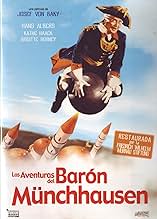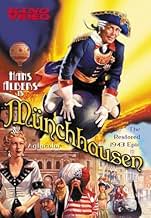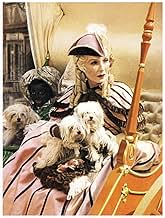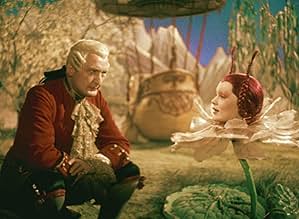अपनी भाषा में प्लॉट जोड़ेंThis lavish, impudent, adult fairy tale takes the viewer from 18th-century Braunschweig to St. Petersburg, Constantinople, Venice, and then to the moon using ingenious special effects, stunn... सभी पढ़ेंThis lavish, impudent, adult fairy tale takes the viewer from 18th-century Braunschweig to St. Petersburg, Constantinople, Venice, and then to the moon using ingenious special effects, stunning location shooting.This lavish, impudent, adult fairy tale takes the viewer from 18th-century Braunschweig to St. Petersburg, Constantinople, Venice, and then to the moon using ingenious special effects, stunning location shooting.
- निर्देशक
- लेखक
- स्टार
- पुरस्कार
- कुल 1 नामांकन
फ़ीचर्ड समीक्षाएं
The film is very rich and vibrant in its cinematography and color, this is very much appreciated when one sees the work that went into the Moon set.
Hans Albers plays an arrogant but lovable rogue who takes many, many years to learn the lesson of what is truly important in a mans life.
I am in agreement with one reviewer in that this film is not at all for children and should be screened carefully, this is a European film and the Hayes Act didn't exist in Germany.
For being made right in the middle of WWII, this is an obscenely expensive - circa $35 million in today's currency - spectacle (given pretty much carte blanche, the producers went overschedule and overbudget) commissioned by the Nazis - but scripted, ironically, by a Jew - on the occasion of the 25th anniversary of Germany's foremost film unit, UFA, it was also seen as a direct response to such foreign-made extravaganzas as Hollywood's THE WIZARD OF OZ (1939) and Britain's THE THIEF OF BAGDAD (1940)! The character of the tale-spinning Baron Munchausen originated in a book by 18th century author Gottfried August Burger which, along the years, has inspired 4 feature-film adaptations (as well as a Silent short by pioneering wizard Georges Melies and an animated short that was thankfully included on the Kino DVD and which will be discussed separately). Despite the stature accorded the 1988 Terry Gilliam version THE ADVENTURES OF BARON MUNCHAUSEN (which I watched only once several years ago and recall being a somewhat hit-or-miss affair), the 1943 film emerges as perhaps the most satisfying cinematic rendition overall.
The film is book-ended by scenes with a contemporary i.e. 1940s setting, in which the Baron (played as a dashing yet cunning womanizer rather than the Quixotic fool envisioned by Terry Gilliam) recounts some of his adventures - in the third person - to a naïve young couple (the female member of which had fallen under his spell at a fancy-dress ball). The rest is an episodic fantasia in which Munchausen - usually driven by the promise of a romance and accompanied by his faithful sidekick - journeys from one country to the other (meeting along the way historical historical figures like Czarina Catherine The Great, Giacomo Casanova and the magician Cagliostro, who endows him with both immortality and the power of invisibility, as well as purely invented characters such as the self-proclaimed "world's fastest runner") until he ends up on the moon itself. Quality varies but the end result, as a whole, is a delight and a veritable feast for the eyes (thanks, in no small measure to the highly pleasing Agfacolor, the splendid production design and the charmingly primitive special effects).
Still, one thing that bothered me about the DVD was the fact that the subtitles barely allowed one time to read them (in all fairness, this had a lot to do with the virtually uninterrupted flurry of the film's dialogue itself - hence, something other than a thin white font should have been adopted)! The extras were more extensive than I had anticipated and up to Kino's standards for a "Special Edition" release - the best, however, was the 17-minute interview with the head of the German archival company that handled the current restoration, which goes into some detail about this as well as the production of the film itself.
DIE ABENTEUER DES BARON MUNCHHAUSEN - EINE WINTERREISE (Hans Held, 1944) **1/2 {6/10}: A pleasant animated short from Germany about the popular title character, made in color but containing no dialogue; it came hot on the heels of the 1943 epic film version - though the latter, apparently, left no recognizable impression on it (as the Baron here looked and acted nothing like the part as played by Hans Albers, nor was the plot 'lifted' from some particular sketch in the episodic film). In fact, the short presents only a couple of incidents (presumably taken from the book which inspired the film version in the first place, and several others made before and after it): one in which the Baron's horse ends up dangling in the air from the façade of a building (seen in the front-cover illustration of the book from which Albers reads during the modern sequences in the film, though the episode itself is not re-enacted) and then when the two of them are chased by a hungry wolf in the snow, with the latter proceeding to swallow the horse in one gulp and replaces it in leading the Baron's sled!
It is filmed in colour and - despite being produced during WWII - no expense had been spared on the lavish sets and costumes. But this is not what this film is all about. As in Gilliam's film, this Münchhausen is a magical character, but it is not the magic you find in a modern animated Walt Disney spectacle, it is a magic with a dark side, a magic that can threaten and seduce and corrupt. Münchhausen himself comes across as an ambiguous character, charismatic and heroic, but by no means cuddly and lovable.
As a result this is more a fairy tale for adults than one for children, and the full original version with nude harem girls, sexual innuendo, etc. wouldn't have passed the American censors of its day and probably still get an R rating today.
Extremely funny and hilariously entertaining, Josef von Baky created an unusual and highly original odyssey through Europe, of a man pursuing the exciting and adventurous. Those who have read the stories, know that some of Munchhausen's more famous deeds include his ride on the cannonball, tying his horse to the tip of a church tower and breaking into the ice, out of which he pulls himself by his own hairs. The first one mentioned can be found in the movie, as well as other humorous scenes, that perfectly fit into the Munchausen concept. Munchhausen lived at the end of the 18th century in Brunswick, but he always traveled around Europe with his loyal servant Christian Kuchenreuter. The story starts out with Munchhausen returning from one of his several trips to his residence in Bodenwerder, where all the jackets in his cabinet get rabies and Christian introduces a fascinating substance, that makes a man's beard grow in a matter of seconds. Hours later, Munchausen leaves for the court of Prince Anton Ulrich of Brunswick, who is commanded to leave for St. Petersburg, and would like Munchhausen to accompany him. On their way to Russia, Munchhausen and Christian encounter the dark Count Cagliostro, who is wanted all over Europe for performing notorious witchcraft. He plainly tells Munchhausen of his intentions to become count of the Courland, and asks Munchhausen to assist him, which he denies, by telling him that he has absolutely no intention of reigning. In St. Petersburg, he meets Katharina the Great and the two become lovers, and he also meets Cagliostro again, and warns him that Katharina intends to arrest him. Out of gratitude, Cagliostro gives Munchausen a ring that makes him invisible and the ultimate gift of eternal youth, as long as Munchhausen wants it.
Baron Munchhausen was never very complex in the original stories, as they mostly focused on his fairy tales, rather than the vast and interesting personality. But here, the man is a very deep and powerful character, who sees people die around him, while he possesses the gift of eternal life, and becomes more and more torn between his desire for adventure and that to share a mortal life with his friends and loved ones. For this movie the basic concept of the Munchhausen stories was changed a bit, with the film being somewhat of a life story, even though there is no real linear plot, with the narrative reminding more of episodes. While a lot of the film is actually more of a historical drama than fantasy, many scenes will bring you into the wonderful world of Baron Munchhausen, including the cream that makes your hair grow in a matter of seconds, the rifle that can shoot accurately for hundreds of miles and the ride to the moon in an air balloon. An exemplary tale of imagination and creative adventures, Munchhausen's visual effects can't measure up the ones of today, of course, but in perspective to the times, they are absolutely stunning.
Some of the acting in this movie really stands out, even though it mostly centers around the colorful sets. Hans Albers makes the perfect Baron Munchhausen, a witty, intelligent, charismatic and very deep character, who is not the perfect hero, but a man who goes through life trying to have it as exciting as possible. Whether he's deeply philosophical, in the middle of one of his fun adventures, or once again seducing a beautiful woman, Albers is extremely convincing as the flawed, but good-hearted Munchhausen, who learns a lot during his life, enough to choose mortality over eternal life at the end. The film features a huge ensemble of characters, and many of them are just part of one episodes in Munchhausen's life. Hermann Speelmans, who plays Munchhausen's loyal servant and friend Christian Kuchenreuter, was also an exemplary casting choice, and manages to be funny (growing his beard in a matter of seconds) and very emotional (rapid aging on the moon) in a number of scenes. Another performer who really stands out is Ferdinand Marian, as the mysterious Count Cagliostro, who is very power-hungry, self-serving, but in the end a thankful and appreciative man, who rewards Munchhausen for warning him by giving him the eternal youth. Brigitte Horney as Katharina the Great is also great in her role, as the proud monarch, who is completely charmed by Munchhausen.
Another thing that might shock you is the nudity in this movie, that wouldn't get past any US-censor these days, as well as some pretty explicit sexual jokes. Therefore, "Munchhausen" really is a fairy tale for adults and not necessarily for children.
What's left to say, is that "Munchhausen" is a beautiful tale of adventures and imagination, that is an impressive document of what Germany's film industry was able to conjure in the 1940s already. And when Hans Albers rides on the cannon ball, turns his head to the audience, and takes off his hat in greeting, you will completely be captured by his charismatic and smart personality that brings the magic to this outstanding movie.
क्या आपको पता है
- ट्रिवियाWriter Erich Kästner is widely reported to be billed as "Berthold Bürger" on this film, but there is in fact no writing credit at all. Kästner was a banned author in Nazi Germany and his books were among those burnt in 1933, which was the reason for the lack of writing credit here. Joseph Goebbels gave Kästner only a special permission to write a script, on which the author was actually named as Berthold Bürger. However he also give instruction to the German press never to mention the real author of the script nor to mention the name Berthold Bürger. Therefore no writing credits in the movie was used.
- गूफ़Sophia's "beauty spots" disappear and reappear during the opening scenes of the film.
- भाव
Doge: I'm glad the balloon is to launch in Venice -- it will advance the cause of science, and provide entertainment for the people. The art of the statesman is, by doing one thing, to achieve two goals.
François Blanchard: I serve only science, your Excellency.
Doge: Of course, it's best for you to believe that. Let no one convince you otherwise.
- इसके अलावा अन्य वर्जनThe length of this film when submitted to the Film Review Office in March 1943, according to the Deutsches Filminstitut, was originally 134 minutes (or 3662 meters). This version was used for the premiere of the film at the Ufa-Palast am Zoo. Three months later, a second version (the general release version) was submitted, cut down to 118 minutes (3225 meters). After the war, the next version (December 1949) was 105 minutes, the 1954 version 101 minutes, the version for general audiences (shown that year) 88 minutes. In 1995, a first restoration was assembled by the F.W. Murnau Foundation, clocking in at 114 minutes. In 2017, a 35mm Agfacolor print was discovered at the Gosfilmofond of Russia. That print, which runs 131m (3590m), was restored and used for the 2019 Blu-ray release.
- कनेक्शनFeatured in Die gefrorenen Blitze (1967)
टॉप पसंद
- How long is The Adventures of Baron Munchausen?Alexa द्वारा संचालित
विवरण
- रिलीज़ की तारीख़
- कंट्री ऑफ़ ओरिजिन
- भाषा
- इस रूप में भी जाना जाता है
- The Adventures of Baron Munchausen
- फ़िल्माने की जगहें
- बर्लिन, जर्मनी(environs)
- उत्पादन कंपनी
- IMDbPro पर और कंपनी क्रेडिट देखें
- चलने की अवधि1 घंटा 50 मिनट
- ध्वनि मिश्रण
- पक्ष अनुपात
- 1.37 : 1
इस पेज में योगदान दें


































